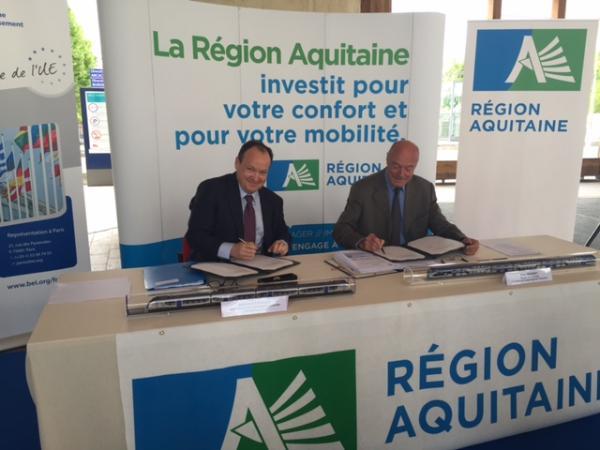
On Friday 17 July 2015, the European Investment Bank (EIB) and Aquitaine's Regional Council signed a €100 million loan for financing the purchase of new trainsets for the TER (regional express train) network. The finance contract was signed at Pessac station by Alain Rousset, President of Aquitaine's Regional Council, and EIB Vice-President Ambroise Fayolle.
This EIB loan will finance the acquisition of 46 new TER trainsets – 24 Regio2N and 22 Régiolis – by the Regional Council on particularly attractive financial terms thanks to the EIB's AAA rating. Combining increased capacity with a high quality of service, these trains will improve the mobility of all the inhabitants of the Aquitaine Region. They will perform better, be more comfortable and consume less energy, providing users with a genuine alternative to private car use. The commissioning of this new rolling stock will therefore result in the creation of some 9000 extra places on the TER network. By mid-2016, 100% of TER Aquitaine's fleet will be totally replaced or upgraded.
This is the third joint operation mounted by the Regional Council and the EIB. As far back as 2012, €800 million was provided for sustainable development and energy efficiency, in what was at the time one of the EIB's biggest commitments in support of a French region. Today's loan brings total EIB financing in Aquitaine to €900 million.
This partnership had two main strands of support: i) €500 million for expanding, bringing up to standard and improving the energy efficiency of secondary schools (e.g. the Hélène Duc vocational college in Bergerac) and training institutes (such as Aquitaine Cap Métiers visited today); and ii) €300 million, channelled through Crédit Agricole and the BPCE Group, for funding businesses promoting renewable energy production and energy refurbishment projects through loans with subsidised interest rates. Thus both the Region and businesses have benefited from loans on financial terms that at present cannot be matched by the market.
Under today's agreement, the two institutions are extending their cooperation to improve the regional express transport service by optimising the financing of the acquisition of 24 Regio2N and 22 Régiolis trainsets with a total cost of around €400 million (of which €200 million financed by the Region).
On course for COP 21
Following this signature, the President of the Regional Council and Vice-President of the EIB went to the regional lifelong training agency Aquitaine Cap Métiers, now called the Vincent Merle Regional Centre after the father of vocational training in France, which has also received EIB support for the energy refurbishment and improvement of its buildings – a symbolic visit just a few months before the Paris 2015 conference.
The Juncker Plan in Aquitaine
This Friday 17 July the EIB Vice-President also met with the members of the Aquitaine midcap club to give them a presentation on the Investment Plan for Europe, the so-called Juncker Plan, and answer their questions on the support that Europe is prepared to provide. A number of Aquitaine midcaps therefore had the opportunity to present their development projects to the EIB Vice-President.
Businesses, especially SMEs (up to 250 employees) and midcaps (up to 3 000 employees) are among the top priorities of the Juncker Plan. The goal is to support their investment in higher risk strategic sectors such as research, innovation and infrastructure, helping them to strengthen their competitiveness on the European and global stage.
The plan was initially endowed with €21 billion (€5 billion from the EIB, and €16 billion from the EU budget), and these funds can be augmented by national contributions (France has committed €8 billion). Functioning as a guarantee mechanism, it will boost the EIB's lending capacity while acting as catalyst by enhancing the ability to take targeted risk, especially with newly developed financing tools. Through its catalytic effect, the plan is expected to leverage a total of least €315 billion worth of new investment in Europe, mostly from the private sector, over the next three years.

Photographer: EIB ©To be defined
Download original

Photographer: EIB ©To be defined
Download original

Photographer: EIB ©To be defined
Download original

Photographer: EIB ©To be defined
Download original

Photographer: EIB ©To be defined
Download original

Photographer: EIB ©To be defined
Download original